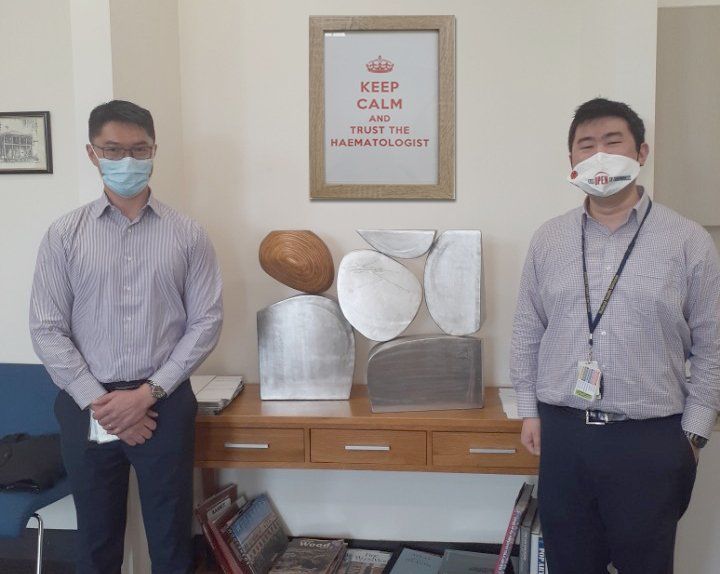Disclaimer: The information shared in this article is accurate at the time of writing on the 17th July 2021, please check for further updates in the future as the information may evolve rapidly
- What is Vaccine Induced Thrombotic Thrombocytopenia (VITT), and what are the symptoms of VITT after Astrazeneca (AZ) vaccine?
VITT or Thrombosis and Thrombocytopenia Syndrome (TTS) is a condition whereby patients develop blood clot(s) and low platelet count on day 4-42 (based on current case reports) following AZ vaccine.
The risk of VITT is very low, especially in patients >60y.o, but it does carry 3% mortality rate in reported cases in Australia.
The mechanism of VITT is different from other blood clotting conditions and is triggered by the immune system’s response to the AZ Vaccine. The blood clots usually occur in uncommon places such as in the brain or abdominal circulation, but could also manifest as deep vain thrombosis (DVT) or lung clots (pulmonary embolism, PE).
Common presenting symptoms include very severe headache, severe abdominal pain, nausea/vomiting, swelling in lower limbs or shortness of breath with chest pain. If you have any of these symptoms – you should contact your GPs or present to emergency department (ED) in case of very significant symptoms.
The doctors would be able to investigate this further by doing blood tests to check for your platelet count and clotting protein, as well as doing scans to check for blood clots in the relevant areas. If there is suspected VITT, they will usually contact a haematologist to obtain further advice. More tests would be subsequently organized to confirm the diagnosis.
Further information: Revised ATAGI statement (17th June 2021) https://www.health.gov.au/news/atagi-statement-on-revised-recommendations-on-the-use-of-covid-19-vaccine-astrazeneca-17-june-2021
More detailed information regarding VITT:
https://www.thanz.org.au/documents/item/591
- I have suffered from blood clot previously or I have been diagnosed with cancer; can I get AZ COVID vaccine?
For most people above the age of 60 years old with previous history of blood clots in the legs (DVT) or lungs (PE), having AZ vaccine is NOT contraindicated.
This is because the mechanism of VITT is different from other blood clotting conditions and is triggered by the immune system’s response to the AZ Vaccine.
AZ vaccine can be given to:
- People with a past history of blood clots in typical sites such as the legs and lungs (DVT or PE).
- People with a predisposition to form blood clots, such as those with Factor V Leiden, or other non-immune clotting disorders
- People with a family history of clots or clotting conditions
- People currently receiving blood-thinner medications
- People with a history of heart attack or stroke
- People with a current or past history of low platelets
However, Pfizer vaccine should be preferenced (regardless of age) for those:
- A past history of blood clot in the brain called cerebral venous sinus thrombosis (CVST)
- A past history of blood clot from medication called heparin/clexane
- A past history of blood clot in the abdomen around the liver/spleen
- History of blood clot disorder called anti-phospholipid syndrome
- People with contraindications to COVID-19 Vaccine AstraZeneca, i.e.
- Anaphylaxis to a previous dose of AZ vaccine, or to an ingredient of the vaccine
- Thrombosis with thrombocytopenia occurring after the first dose of AZ vaccine
- Other serious adverse events attributed to the first dose of AZ vaccine
There are currently NO contra-indications for people with cancer (blood cancer or other cancers) to receive AZ vaccine – this is NOT a live vaccine. Please speak to your GP or specialist if you have any concerns.
For further information, please refer to the joint ATAGI and THANZ statement (23rd May 2021):
- I am older than 60 years old and have no contra-indications to AZ vaccine. Should I get my AZ vaccine now, or wait for Pfizer Vaccine?
This is a difficult question, but it really depends on the risks of getting VITT) vs potential benefit in getting the vaccine now (as opposed to months later).
An Australian government document (29th June 2021) highlighted that the benefit of receiving AZ vaccine now will outweigh the potential risks of blood clot in older population in low risk COVID scenario. It may also benefit younger people if the COVID risk (including ICU admission and death) is increasing.
Given the recent surges in cases of COVID in NSW and Victoria, I believe its all the more important to consider getting the AZ vaccine sooner rather than later. Please discuss this further with your GP or specialist.
For further information of the risks and benefit, please refer to this article from 29th June 2021:
- Can I get VITT after my 2nd dose of AZ vaccine?
The current evidence from the UK experience suggests that the risk of VITT after 2nd dose of AZ vaccine is extremely low – 1.5 cases per million dose (compared to 14.2 per million 1st dose).
If a patient has not had any issues with the 1st dose – it is very unlikely for them to develop any major issues in the 2nd dose. Therefore, it is reasonable to complete 2 doses of AZ vaccine.
Whilst there is some suggestion of switching vaccine brands (e.g, 1st dose AZ followed by Pfizer) could still lead to good efficacy – this is not currently approved in Australia.
For further information:
Summary Recommendations:
1. Australian Technical Advisory Group on Immunisation (ATAGI) advises that Pfizer is preferred to AZ vaccine from the age of 16 to under 60 years.
2. ATAGI considers the benefit of vaccination in preventing COVID-19 with AZ vaccine outweighs the risk of VITT in people aged 60 and above.
3. AZ vaccine can be used in adults aged under 60 years for whom Pfizer vaccine is not available, the benefits are likely to outweigh the risks for that individual and the person has made an informed decision.
4. People of any age without contraindications who have had their first dose of AZ vaccine without any serious adverse events should receive the second dose.
Dr Pohan Lukito
Consultant Haematologist
MBBS, B Med Sci, FRACP, FRCPA









